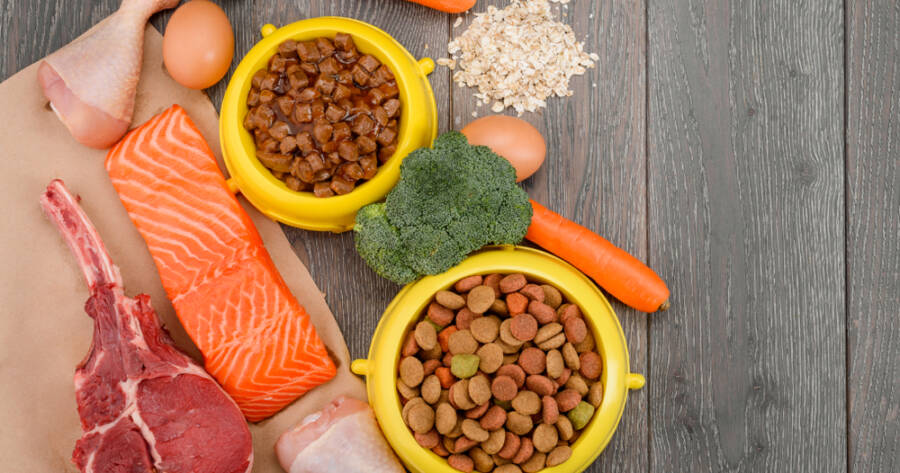Many pet owners want the best nutrition for their furry companions, and high-protein diets have become a popular choice. Supporters claim they provide better energy, muscle health, and overall well-being. But are these diets truly beneficial, or do they pose risks? Understanding how protein affects dogs and cats can help you decide if a high-protein diet is right for your pet.
Why Do Pets Need Protein?
Protein is an essential part of a pet’s diet. It supports muscle growth, helps maintain a strong immune system, and plays a role in skin and coat health. Both dogs and cats rely on protein to build and repair tissues, produce enzymes, and support organ function.
Cats, in particular, are obligate carnivores, meaning their bodies are designed to thrive on animal-based proteins. Unlike dogs, which can digest plant-based foods more efficiently, cats require higher levels of protein to stay healthy. Dogs, though omnivorous, still benefit from a protein-rich diet, but their bodies can adapt to a wider range of nutrients.
The Benefits of a High-Protein Diet
A high-protein diet can offer several advantages, especially for active pets. Protein provides the amino acids needed for muscle maintenance and repair, making it ideal for working dogs, athletic breeds, and growing kittens or puppies. It also helps senior pets maintain muscle mass, which naturally declines with age.
In addition to muscle health, protein supports a shiny coat and healthy skin. Pets that consume high-quality proteins often have stronger, more resilient fur. Protein also aids in the production of enzymes and hormones that regulate metabolism and other vital functions.
Potential Risks of Too Much Protein
While protein is essential, excessive amounts can sometimes cause problems. One of the biggest concerns is kidney health. When a pet consumes more protein than their body needs, their kidneys work harder to filter out excess waste. For healthy pets, this isn’t usually an issue, but for those with existing kidney disease, a high-protein diet may worsen their condition.
Digestive issues are another possible concern. Some pets have sensitive stomachs and may struggle to process large amounts of protein, leading to diarrhea or bloating. The source of protein also matters—low-quality proteins or heavily processed ingredients may cause more harm than good.
Weight gain is another factor to consider. If a high-protein diet also contains excess fat and calories, it can lead to obesity, especially in less active pets. Balancing protein intake with regular exercise is key to maintaining a healthy weight.
How to Choose the Right Protein Source
Not all protein is created equal. High-quality animal proteins, such as chicken, beef, fish, and turkey, provide essential amino acids that pets need for overall health. Some plant-based proteins, like lentils and peas, are used in pet food, but they don’t always offer the same level of digestibility.
Here are some important factors to consider when choosing protein sources:
- Digestibility: Animal-based proteins are generally easier for pets to digest than plant-based proteins.
- Amino acid profile: Essential amino acids should be present in the right balance to support your pet’s health.
- Processing methods: Overly processed proteins may lose some of their nutritional value, so minimally processed options are often better.
If you’re unsure about which protein source is best for your pet, consult your veterinarian. They can recommend a diet tailored to your pet’s specific needs.
Is a High-Protein Diet Right for Your Pet?
The ideal diet depends on factors such as age, activity level, and overall health. Young, active pets often thrive on higher protein intake, while older or less active pets may need a more balanced approach. Pets with kidney disease, liver issues, or digestive sensitivities may require a modified protein intake.
For owners considering a high-protein diet, gradual transitions are important. Sudden dietary changes can upset a pet’s stomach. Introducing new food slowly allows their digestive system to adjust and helps prevent discomfort.
Remember: Balance Is Key
Protein is an essential nutrient that plays a major role in your pet’s health, but more isn’t always better. A well-balanced diet that meets your pet’s unique needs is the best approach.
Whether you choose a high-protein diet or a more moderate option, focusing on quality ingredients and proper portion sizes will ensure your pet stays happy and healthy. When in doubt, always consult a veterinarian to determine the best diet for your furry friend.

